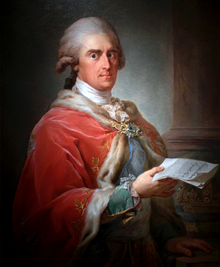
Back فريدريش أغسطس الأول Arabic بیرینجی فردریک آقوستوس AZB Фрыдрых Аўгуст I (кароль Саксоніі) Byelorussian Фридрих Август I (Саксония) Bulgarian Frederic August I de Saxònia Catalan Fridrich August I. Saský Czech Frederik August 1. af Sachsen Danish Friedrich August I. (Sachsen) German Φρειδερίκος Αύγουστος Α΄ της Σαξονίας Greek Frederiko Aŭgusto la 1-a (Saksio) Esperanto
This article needs additional citations for verification. (June 2023) |
| Frederick Augustus I | |||||
|---|---|---|---|---|---|
 Portrait by Marcello Bacciarelli, 1809 | |||||
| King of Saxony | |||||
| Reign | 20 December 1806 – 5 May 1827 | ||||
| Coronation | 20 December 1806 | ||||
| Successor | Anthony | ||||
| Duke of Warsaw 1812–1813 King of Poland (disputed) | |||||
| Reign | 9 June 1807 – 22 May 1815 | ||||
| Successor | Alexander I (as King of Poland) | ||||
| Elector of Saxony | |||||
| Reign | 17 December 1763 – 20 December 1806 | ||||
| Predecessor | Frederick Christian | ||||
| Co-regents | Francis Xavier (1763–1768) Maria Antonia (1763–1768) | ||||
| Grand Duke of Lithuania (disputed) | |||||
| Reign | 1 July 1812 – 14 December 1812 | ||||
| Predecessor | Alexander I (as Emperor of Russia, titular ruler) | ||||
| Successor | Alexander I | ||||
| Born | 23 December 1750 Dresden, Electorate of Saxony, Holy Roman Empire | ||||
| Died | 5 May 1827 (aged 76) Dresden, Kingdom of Saxony, German Confederation | ||||
| Burial | |||||
| Spouse | |||||
| Issue | Princess Maria Augusta of Saxony | ||||
| |||||
| House | Wettin | ||||
| Father | Frederick Christian, Elector of Saxony | ||||
| Mother | Princess Maria Antonia of Bavaria | ||||
| Religion | Roman Catholicism | ||||
| Signature | |||||
Frederick Augustus I (German: Friedrich August I.; Polish: Fryderyk August I; French: Frédéric-Auguste Ier; 23 December 1750 – 5 May 1827) was a member of the House of Wettin who reigned as the last Elector of Saxony from 1763 to 1806 (as Frederick Augustus III) and as the first King of Saxony from 1806 to 1827.[1] He was also Duke of Warsaw from 1807 to 1815 (in 1812–1813 he was proclaimed, but unrecognized, King of Poland by the General Confederation of the Kingdom of Poland), a short-lived disputed Grand Duke of Lithuania in 1812, and a legitimate candidate to the Polish throne.
Throughout his political career Frederick Augustus tried to rehabilitate and recreate the Polish state that was torn apart and ceased to exist after the final partition of Poland in 1795. However he did not succeed, for which he blamed himself for the rest of his life. Nevertheless, his efforts at reestablishing an independent Polish nation did endear him to the Polish people.
The Augustusplatz in Leipzig is named after him.
- ^ "Anton Graff (1736-1813) - Friedrich August I, King of Saxony (1750-1827)". www.rct.uk. Retrieved 2023-12-16.